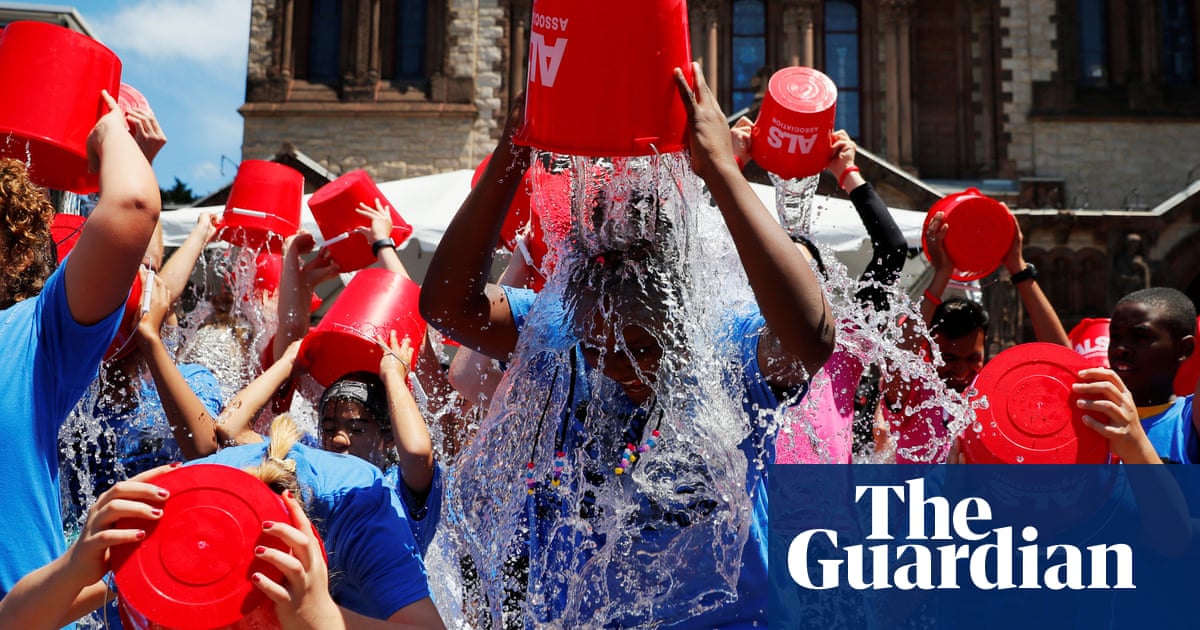Adecade ago, when the Ice Bucket Challenge became a viral sensation, everybody from world leaders to sports stars and Hollywood royalty filled social media with videos of them having vats of cold water and ice cubes dumped over their heads.
Their videos were often notable for the casual, conspicious luxury of the backgrounds: LeBron James’ sodden discomfort was offset by the superyacht on which he performed his icy ablutions; Donatella Versace let out her unscripted yowl in her glorious garden flanked by equally gorgeous and muscled male helpers. Donald Trump predictably chose the top of Trump Towers for his stunt.
Raising funds and global awareness for motor neurone disease, or ALS as it’s known in America, the craze even caught on among those of us without a personal pool or glamorous garden – with schoolteachers and pupils, police officers and nurses taking part.
The challenge involved pouring a bucket of ice-cold water over your head, posting the video on social media and nominating someone else to complete the challenge or donate to charity, or both. More than 17 million people took part across the world.
It raised an estimated $220m (£165m) forcharities fighting to find a curefor the progressive disease that attacks the motor nerves causing muscle weakness and wasting.
Now, the Ice Bucket Challenge is back: resuscitated by a group of US college students who lost two friends to suicide, using the hashtag #SpeakYourMIND to raise mental health awareness. The hashtag has already been shared thousands of times, raising hundreds of thousands of pounds for the cause.
“The original Ice Bucket Challenge was a turning point for our charity,” said Richard Evans, the director of engagement for the Motor Neurone Disease (MND) Association. “It ignited the fight against MND and gave us a new benchmark for fundraising. Every year since the challenge, we’ve increased fundraising: last year, we raised £37.9m – more than we’ve ever raised before.”
Speaking about the decision to revive the challenge, Wade Jefferson, a student at the University of South Carolina and founder of the college’s Mind (Mental Illness Needs Discussion) club, said: “It started as a random idea, inspired by the original ALS Ice Bucket Challenge and how powerful that movement was.”
As with the previous phenomenon, the movement is gaining traction first in the US: the formerNFLplayers Peyton Manning, Emmanuel Sanders, James Charles and Haley Baylee have already participated. Carson Daly, a host of Today, dumped a bowl of ice water onJenna Bush Hagerin a segment earlier this week.
“Watching it take off – seeing people we admire, likePeyton Manning, join in – has been surreal. We’re proud, grateful, and just excited to see how far it’s gone and continues to go,” said Jefferson.
“Just as the original Ice Bucket Challenge did for ALS, this version is turning awareness into action. Beyond the buckets and the contagious videos, it’s about breaking stigma, building community and making mental health a visible, valued part of everyday conversation.”
The new challenge has already raised more than Jefferson dreamed of: originally aiming to raise $500 (£372), the campaign raised more than £142,000 in a few days. Active Minds then set a new goal of $250,000 (£187,048) – but by Friday, about$338,000had already been donated.
Some have, however, thrown cold water on the new challenge, citing concerns about participating in a mental health movement tied to receiving a nomination from someone on social media – which could leave some feeling left out if they don’t hear their name called.
But Jefferson said there was more to the challenge than taking part. “Participants are encouraged to share educational resources – including self-care tools, ways to offer help and information to access crisis support – available atactiveminds.org,” he said. “Together, we’re not just starting a challenge – we’re creating a new era of mental health.”
Others have questioned whether the fundraising approach should be used to raise awareness for issues other than MND. But Evans said: “The MND Association hasn’t been using it as a fundraising tool over the last few years, so if others doing important work want to take it forward, then we wish them all the very best.”
Evans said his charity had discussed resurrecting the challenge last year but decided against it. “We decided to look forward and develop new fundraising opportunities rather than going back to something that was a massive success all those years ago,” he said.
“With the fantastic campaigning and sad deaths of [rugby players] Doddie Weir and Rob Burrow, the ongoing work of Kevin Sinfield, and the MND plotline in Coronation Street last year, the public’s awareness of the disease has been transformed, which is showing in the amazing sums that we’re fundraising and devoting to finding a cure for the disease.”
The ALS Association also praised Mind’s efforts, saying it was “thrilled” that the Ice Bucket Challenge was making a comeback and becoming a “new form of activism”.
“We applaud efforts to raise awareness for causes like mental health – an issue that also affects the ALS community in profound ways,” said a spokesperson.
